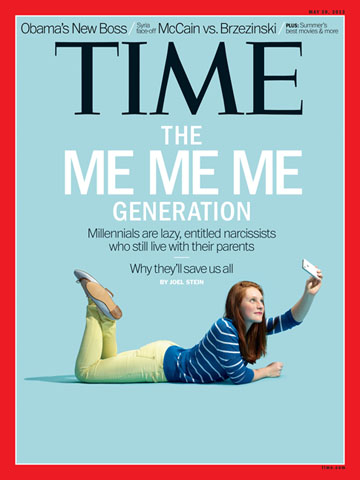
(2 of 8)
In the U.S., millennials are the children of baby boomers, who are also known as the Me Generation, who then produced the Me Me Me Generation, whose selfishness technology has only exacerbated. Whereas in the 1950s families displayed a wedding photo, a school photo and maybe a military photo in their homes, the average middle-class American family today walks amid 85 pictures of themselves and their pets. Millennials have come of age in the era of the quantified self, recording their daily steps on FitBit, their whereabouts every hour of every day on PlaceMe and their genetic data on 23 and Me. They have less civic engagement and lower political participation than any previous group. This is a generation that would have made Walt Whitman wonder if maybe they should try singing a song of someone else.
They got this way partly because, in the 1970s, people wanted to improve kids' chances of success by instilling self-esteem. It turns out that self-esteem is great for getting a job or hooking up at a bar but not so great for keeping a job or a relationship. "It was an honest mistake," says Roy Baumeister, a psychology professor at Florida State University and the editor of Self-Esteem: The Puzzle of Low Self-Regard. "The early findings showed that, indeed, kids with high self-esteem did better in school and were less likely to be in various kinds of trouble. It's just that we've learned later that self-esteem is a result, not a cause." The problem is that when people try to boost self-esteem, they accidentally boost narcissism instead. "Just tell your kids you love them. It's a better message," says Jean Twenge, a psychology professor at San Diego State University, who wrote Generation Me and The Narcissism Epidemic. "When they're little it seems cute to tell them they're special or a princess or a rock star or whatever their T-shirt says. When they're 14 it's no longer cute." All that self-esteem leads them to be disappointed when the world refuses to affirm how great they know they are. "This generation has the highest likelihood of having unmet expectations with respect to their careers and the lowest levels of satisfaction with their careers at the stage that they're at," says Sean Lyons, co-editor of Managing the New Workforce: International Perspectives on the Millennial Generation. "It is sort of a crisis of unmet expectations."
What millennials are most famous for besides narcissism is its effect: entitlement. If you want to sell seminars to middle managers, make them about how to deal with young employees who e-mail the CEO directly and beg off projects they find boring. English teacher David McCullough Jr.'s address last year to Wellesley High School's graduating class, a 12-minute reality check titled "You Are Not Special," has nearly 2 million hits on YouTube. "Climb the mountain so you can see the world, not so the world can see you," McCullough told the graduates. He says nearly all the response to the video has been positive, especially from millennials themselves; the video has 57 likes for every dislike.
